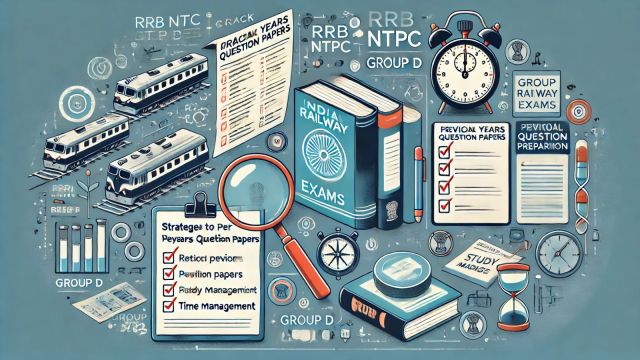RRB NTPC, Group D: How to crack Railway exams? Analyse previous years’ question papers
These exams, conducted by the Railway Recruitment Boards (RRBs), require strategic preparation, consistent effort, and a thorough understanding of the syllabus and exam pattern.
 These exams, conducted by the Railway Recruitment Boards (RRBs), require strategic preparation, consistent effort, and a thorough understanding of the syllabus and exam pattern. (Image: AI Generated)
These exams, conducted by the Railway Recruitment Boards (RRBs), require strategic preparation, consistent effort, and a thorough understanding of the syllabus and exam pattern. (Image: AI Generated)— Anil Nagar
The Indian Railways is one of the country’s largest employers that offers diverse career opportunities across various roles. Among them, the Non-Technical Popular Categories (NTPC) and Group D positions stand out as the most sought-after, attracting lakhs of aspirants.
These exams, conducted by the Railway Recruitment Boards (RRBs), require strategic preparation, consistent effort, and a thorough understanding of the syllabus and exam pattern.
Understanding the Exams
NTPC
Non-Technical Popular Category (NTPC) caters to graduates and undergraduate posts such as:
–Station masters
–Commercial Apprentices
–Traffic Assistants
The selection process includes two computer-based tests (CBT 1 and CBT 2), followed by a skill test for certain positions and document verification.
Group D
Group D focuses on recruitment for roles
–Track Maintainers
–Helpers
–Assistant Pointsman.
The selection process includes a computer-based test, a Physical Efficiency Test (PET), and document verification.
Last Year’s Paper Analysis For RRB NTPC and Group D
Analysing the previous year’s paper gives valuable insights into the difficulty level of the examination and the types of questions asked, helping future aspirants plan their preparation strategies.
RRB NTPC Exam Analysis
The overall difficulty level of the previous RRB NTPC exam was moderate to difficult. The questions were distributed across four main sections: Mathematics, General Intelligence and Reasoning, General Awareness, and General Science.
Mathematics
The questions in this section were moderate, with a special focus on Arithmetic (percentage, time and work, simple interest, profit and loss) and Data Interpretation. Algebra and Geometry were also asked, with a few questions based on Ratio and Proportion.
General Intelligence and Reasoning
This section was also moderately difficult. The questions were primarily based on Syllogism, Analogies, Blood Relations, Coding-Decoding, and Number Series.
General Awareness
This was an important section with a heavy focus on Current Affairs from the last 6-12 months. There were also questions on Indian history, geography, politics, and economy, making it an important area to stay updated on.
General Science
The questions ranged from easy to moderate and focused mainly on basic concepts of Physics, Chemistry, and Biology, with Physics being the most prominent.
Group D Exam Analysis
The previous RRB Group D exam was considered easy to moderate.
Mathematics
The focus was again on Arithmetic with simpler questions on Profit & Loss, Time and Work, and Percentage.
General Intelligence and Reasoning
The section had questions on Number Series, Blood Relations, Coding-Decoding, and Analogies with simple patterns.
General Awareness
Current Affairs and General Knowledge dominated this section, including questions on Indian History, Geography, and Polity.
General Science
The questions were largely from basic Physics, Chemistry, and Biology, with most being easy to answer based on fundamental concepts.
Strategic Syllabus Coverage & Chapter Focus
Effective preparation involves covering the complete syllabus, prioritising important chapters, and employing smart study techniques.
Mathematics
Arithmetic (profit/loss, percentages, ratios, time & work, simple & compound interest), Algebra (equations, inequalities), and Data Interpretation are high-scoring areas.
Strategy: Build a strong foundation in basic concepts. Practice regularly, focusing on speed and accuracy. Utilise shortcuts and tricks for faster problem-solving.
General Intelligence and Reasoning
Important Topics: Number series, analogies, coding-decoding, and syllogisms are the most commonly asked topics.
Strategy: Understand the underlying logic behind each type of question. Practice different patterns and variations. Regular practice will help to improve analytical skills.
General Awareness
Focus Areas: Current events (national and international), Indian History (especially modern history), Indian Polity, and basic Economics are important.
Strategy: Current affairs is an important part of the General Awareness section. Read newspapers and engage with current events by reading the articles and solving quizzes.
General Science
Basic concepts of Physics (laws of motion, light, sound), Chemistry (chemical reactions, periodic table), and Biology (cell structure, human body systems) are important.
Strategy: NCERT Books (Class 9 & 10) are an excellent resource for building a strong foundation. Focus on understanding the concepts rather than just learning.
Effective Preparation Strategies
Now that candidates have the map, it is important to know the engine that will drive them to success, which is the effective strategy.
Have a Timetable
A well-structured timetable is like a train schedule. It keeps candidates on track. Divide the syllabus and allocate specific time slots for each subject.
Gather Relevant Resources
Choose reliable and authentic study materials like books, question papers from previous years, etc., focusing on quality over quantity.
Practice, Practice, Practice
Solving previous years’ papers and mock tests is like rehearsing for the performance. It familiarises candidates with the exam format, helps identify weak areas, and improves time management.
Conceptual Clarity is Key
Don’t just memorise formulas or facts. Try to understand the concepts, as it will help to tackle even the trickiest questions.
Time Management is Important
Practice solving questions and attempt mock tests within the stipulated time. This will help to improve the speed and accuracy during the exam.
Revision is Your Best Friend
Regular revision is like maintaining the engine to ensure smooth functioning. Don’t let what you have learned gather dust; revise them at regular intervals.
Stay Fit, Stay Focused
Physical and mental well-being are required for effective preparation. Ensure to remain fit and focused by following a healthy lifestyle.
Nagar is the founder of Founder and CEO of Adda247





- 01
- 02
- 03
- 04
- 05


























